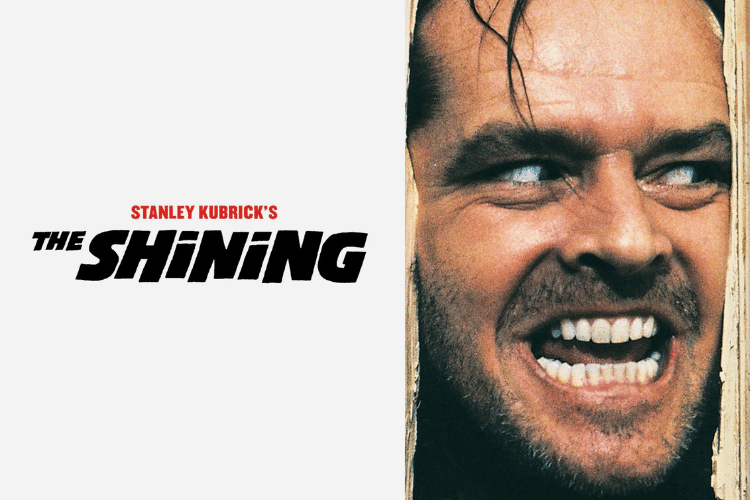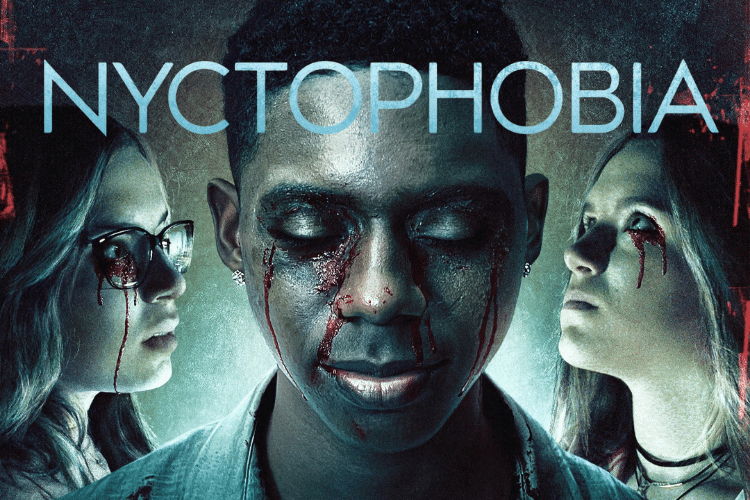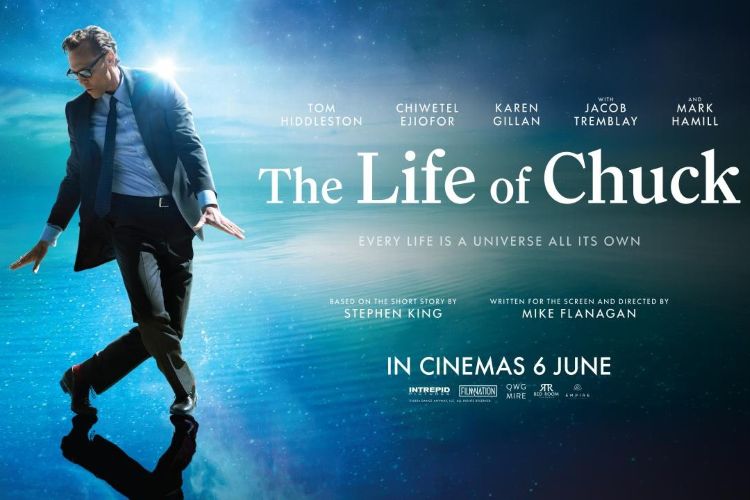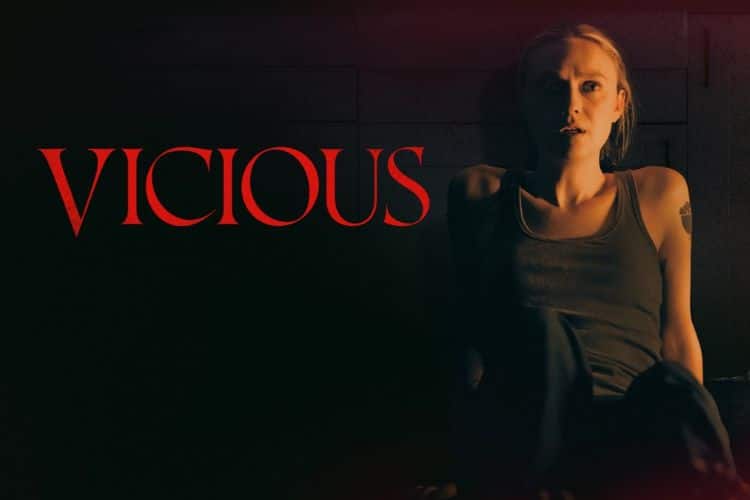“All Work and No Play…”
Main Cast: Jack Nicholson, Shelley Duvall
Director: Stanley Kubrick
There is no more polarizing movie in the Stephen King cinematic library than 1980’s THE SHINING. The reason is simple: it’s a brilliant movie, but it’s not THE SHINING of the Stephen King novel.
It’s got a basically similar plot. Jack Torrance and his wife Wendy and their young son Danny are going to spend the winter as caretakers of The Overlook Hotel in Colorado. The Overlook is a sinister place, full of ghosts real or imagined, a fact which is amplified by young Danny’s developing psychic ability wherein he is able to perceive past, present, or future events he should otherwise have no way of knowing, a gift which is communicated to him by his imaginary friend Tony.
Over the course of the winter, Jack, a recovering alcoholic, slowly devolves into a state of madness, helped along by the evil that resides in the hotel, until he attempts to murder his family. Jack, however, sees himself as merely doing his duty. He has signed a contract to look after the Overlook, so when Wendy says she wants them to leave as soon as possible, Jack feels–thanks to some persuading by one of the Overlook’s ghostly residents–that he must “correct” her.
The problem with the movie comes in the fact that a huge chunk of what makes the novel so effective as an outstanding classic in the horror genre is entirely missing from this adaptation. Gone are the malevolent topiary animals, gone is the sentient fire hose, gone is the infamous scrapbook full of stories of the things that have taken place in the hotel (the scrapbook does make a very brief appearance on Jack’s worktable in one scene, but its significance is never explained).
Instead what we get is a hedge maze, a creepy set of murdered twins, a father whose descent into madness is not at all convincing because we’re already pretty sure he’s slightly left of center from the moment we meet him, and an ending that is anything BUT reminiscent of the climax found in the novel.
It’s almost as if, in deciding to make THE SHINING, writer/director Stanley Kubrick merely skimmed the novel and went from there. I exaggerate to make a point, obviously we know that’s not the case, but the connections between novel and movie are so tenuous, it’s not a difficult scenario to envision.
So, how does a movie which seems to cut out most of what made the source material so effective become an established classic in its own right? Because it’s one damn good movie. Stanley Kubrick’s adaptation of THE SHINING is one of those movies you can watch over and over and never get tired of. I could probably sit through this 143-minute movie every day for a month and love it just as much every time; it’s just so darn watchable.

While I personally don’t find the movie very terrifying (and my then-13-year-old daughter who read the novel, then watched the movie for comparison, prefers the novel and said of the movie, “That wasn’t scary at all, the book is much better.”) there’s no denying it is a beautifully-made piece, with an amazing amount of attention paid to every detail. This attention to detail is never more apparent than in the interior sets of the Overlook itself. When you realize this set was a sound stage and that every single thing on camera, every light fixture, every piece of decoration, every picture hanging on the wall, it’s all staged, none of this was pre-existing before being built specifically for this movie. I mean, the interiors are friggin’ huge, and they’re absolutely 100% convincing as the interior of an empty hotel in the middle of nowhere.
Another factor that plays into the movie’s effectiveness is the score. Not just the score, the entire sound design of the movie, every noise we hear contributes to the atmosphere of the film, whether it’s the howling of the wind in those final scenes, the way Jack’s tennis ball and typewriter echo throughout the room, or the heartbeat-like thumping we hear throughout some scenes. Everything plays a part in establishing the sense of isolation and emptiness the movie is trying to convey.
And let’s not forget the cinematography. THE SHINING is an utterly beautiful film to watch. This movie is so well-shot and well-scored, you could watch it without a word of dialogue being spoken, and you would still get everything that it’s about. The story would be conveyed just as completely without a word being spoken.
All of these things-the set design, the sound, the cinematography, it all works perfectly together in making the hotel the fourth main cast member.
Plot differences aside, another major thorn in the side of novel-purists would be the performances by Jack Nicholson as Jack Torrance and Shelley Duvall as his wife Wendy. Nicholson looks like a madman, it can’t be helped. It’s just the way it is, so even in the early scenes when he’s playing entirely straight, before an ounce of madness has begun to creep into his personality (an event that is so gradual in the novel, it’s shocking when he finally does break), we can still spot that little gleam of something’s not right in that head of his, which sets us immediately on edge. And it ruins some of the effectiveness of what comes later, because we’re not watching a man on the downward spiral, we’re watching someone who’s almost at the bottom already and has very very little left to lose before he’s full-on nuts.
But an even bigger disappointment, for me, was Duvall’s portrayal of Wendy as a mousy, meek and fidgety “yes, dear” wife who was obviously born without a backbone. I just couldn’t reconcile this version of the character with the version I know is much closer to the truth. In the novel Wendy has a personality and opinions and while the bulk of her character may be of the “stand by your man” variety, she’s certainly not the kowtowing, simpering weakling as played by Duvall. There is acting, and then there’s a time to dial it back a little.
As an adaptation of a great horror novel, THE SHINING fails in many respects. Mostly it fails in capturing the heart of the novel, which is what any good adaptation should do, I think. But I also think this is one of those cases where we have to overlook that aspect of things and just focus on the movie as its own entity. And as its own entity, THE SHINING succeeds on so many more levels than it fails that we don’t care anymore what aspect of the novel is missing, because look at that production, look at that editing, look at that wave of blood pouring out of the elevator. It’s definitely not what a fan of the novel would be expecting in a movie adaptation, but it still works.
King in Film
The Shawshank Redemption (1994)
Children of the Corn III: Urban Harvest (1995)
Sometimes They Comes Back … Again (1996)
Children of the Corn IV: The Gathering (1996)
The Revelations of ‘Becka Paulson (1997)
Children of the Corn V: Fields of Terror (1998)
Timberline Lodge image by Mt. Hood Territory (CC 2.0)

C. Dennis Moore is the author of over 60 published short stories and novellas in the speculative fiction genre. Most recent appearances are in the Dark Highlands 2, What Fears Become, Dead Bait 3 and Dark Highways anthologies. His novels are Revelations, and the Angel Hill stories, The Man in the Window, The Third Floor, and The Flip.







Comments
Mountainhead Starring Steve Carell | Movie Rewind
[…] at a mountaintop mansion (very reminiscent of the Overlook Hotel), Mountainhead follows four billionaires as they retreat from the world to rest their weary […]
Gramma: Twilight Zone Episode - King on Film | Movie Rewind
[…] The Shining (1980) […]